|
|
|
Sort Order |
|
|
|
Items / Page
|
|
|
|
|
|
|
| Srl | Item |
| 1 |
ID:
098326


|
|
|
|
|
| Publication |
2010.
|
| Summary/Abstract |
Most of the advanced democracies agree that confidentiality is needed in
terms of technical performance parameters; the numbers to be procured
and methods of deployment, which may provide unique advantages to the
user. Instead of the military or the civil servants treating these aspects
exclusively as military capability issue, legislative intervention is needed
for professionalizing and institutionalizing public accountability of security
sector. Parliamentary processes have constitutional legitimacy and duty
to examine security sector accountability. It however, lacks resources,
capacities and political will to do so.
|
|
|
|
|
|
|
|
|
|
|
|
|
|
|
|
| 2 |
ID:
098316
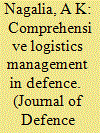

|
|
|
|
|
| Publication |
2010.
|
| Summary/Abstract |
The RFP should define the sustained capability required for a defined period
of time. It should ask the vendors to give technical and commercial proposals
for owning and exploiting the same as per the defined usage at a specified level
of operational readiness. The provisions for defence offset should be leveraged
for setting up the necessary JVs to provide life time training, maintenance
and logistic support in accordance with the principles of PBL. In case any
existing infrastructure could be made available to him, its details and lease
arrangements should also be specified.
|
|
|
|
|
|
|
|
|
|
|
|
|
|
|
|
| 3 |
ID:
098314
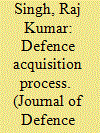

|
|
|
|
|
| Publication |
2010.
|
| Summary/Abstract |
The issues of the Department of Defence Porduction pertain to the development of indigenous production capability in the sphere of defence.
|
|
|
|
|
|
|
|
|
|
|
|
|
|
|
|
| 4 |
ID:
098315
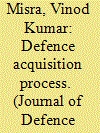

|
|
|
|
|
| Publication |
2010.
|
| Summary/Abstract |
Aspects of cost-efficient QR formulation, RFI and RFP, technical and commercial evaluation including time frames for evaluation, imparting project management orientation to the entire acquisition process including post contract deficiencies were covered in a seminar organised by IDSA on October 27, 2009 seminar.
|
|
|
|
|
|
|
|
|
|
|
|
|
|
|
|
| 5 |
ID:
098323
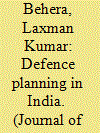

|
|
|
|
|
| Publication |
2010.
|
| Summary/Abstract |
Although India's defence planning mechanism has evolved over the years, it is
still inadequate with respect to prioritisation of precious resources, optimum
force suture and creation of a strong domestic defence industrial base. Given
India's complex security environment and massive expenditure on national
defence, the planning mechanism needs to be strengthened by articulation of
national security objectives and creation of Chief of Defence Staff (CDS). The
CDS and its supporting structure, as argued by the Group of Ministers (GoM),
would be in a better position to bring in necessary reforms which the present
system is constrained to do.
|
|
|
|
|
|
|
|
|
|
|
|
|
|
|
|
| 6 |
ID:
098317


|
|
|
|
|
| Publication |
2010.
|
| Summary/Abstract |
There is a strong case for factoring in the impact of defence acquisitions
on national economy, industrial capabilities and employment generation.
Indigenous systems cannot be promoted without firm conviction on its rationale
and advantages. Major systemic changes will have to be effected in the process of
requirements generation, development and manufacturing, test and evaluation
in order to make progress towards greater self reliance.
|
|
|
|
|
|
|
|
|
|
|
|
|
|
|
|
| 7 |
ID:
098318
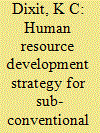

|
|
|
|
|
| Publication |
2010.
|
| Summary/Abstract |
Army personnel trained and equipped for conventional warfare find
themselves at a disadvantage when deployed for sub-conventional operations.
The advancement in technology, changing warfare concepts, induction of
sophisticated weapons and support equipments and need to handle far too
many variables demand deliberate efforts in ensuring recruitment of desired
human resource and their training in the army to suit the requirements of
conventional as well as sub-conventional warfare. This is essential since
possibility of conventional war can not be totally ruled out and at the same
time relevance of sub-conventional operations in today's scenario can no longer
be ignored. This paper is an attempt to evolve a suitable human resource
development strategy for capacity building in Army for coping stress in subconventional
warfare.
|
|
|
|
|
|
|
|
|
|
|
|
|
|
|
|
| 8 |
ID:
098319
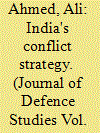

|
|
|
|
|
| Publication |
2010.
|
| Summary/Abstract |
Continued engagement with LOAC and IHL is ongoing with the Judge Advocates
General Department taking the primary role. Its training institution in Kamptee
is at the forefront. There has been increased interaction with the ICRC since
India opened up to the ICRC in the mid nineties, after initially being defensive
with respect to Kashmir. Not only has IHL been introduced into officer and
subordinate ranks courses, but guest lectures are also organised. Increased
scope of the engagement is possible, particularly if it finds mention in the next
edition of the Army doctrine. Increasing the scope of adherence to IHL, such as
by acceding to AP I and the ICC, can be debated. Even if India remains outside,
it can be expected that it would follow the tenets as a responsible power.
|
|
|
|
|
|
|
|
|
|
|
|
|
|
|
|
| 9 |
ID:
098325
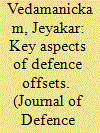

|
|
|
|
|
| Publication |
2010.
|
| Summary/Abstract |
The DPP has proved to be a dynamic document, with improvements with every
successive version minimising ambiguities. Documents where ambiguities are
either absent or minimum; documents that are transparent and are open to
anyone connected; and documents that have good guidelines and directives,
serve as an anchor when resolving conflicts that may arise in execution of
activities in the related field. The DPP is one such document in the process of
defence procurement.
|
|
|
|
|
|
|
|
|
|
|
|
|
|
|
|
| 10 |
ID:
098324
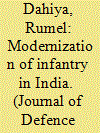

|
|
|
|
|
| Publication |
2010.
|
| Summary/Abstract |
Besides equipping the infantry, a serious look also needs to be given to its
training. Use of tactical simulators for training commanders up to unit level,
support weapons and advanced infantry weapons simulators, driving and
communication simulators have to be procured and utilised to train better
educated soldiers who will be required to handle more complex weapon systems
and equipment in future. More than the shortcoming in educational standards
among the soldiers there is a lack of understanding on part of the officers for
need to train their command better and mange the time more gainfully. For this
to happen the working ethos in the Army will have to undergo a change and
senior officers will have to give a lead. Besides, a serious thought also needs to
be given to re-organisation of mountain formations to enhance their combat
capabilities which have remained unchanged for many decades. They need to
be provided with tools for better situational awareness, fire power, command
and control, manoeuvrability, better logistics and greater staying power.
|
|
|
|
|
|
|
|
|
|
|
|
|
|
|
|
| 11 |
ID:
098321
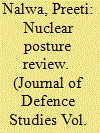

|
|
|
|
|
| Publication |
2010.
|
| Summary/Abstract |
The Nuclear Posture Review (NPR) emphasis two realities, first the challenge of
nuclear terrorism and proliferation; and second, it affirms the end of the Cold
War rivalries. But the "resetting" of relationship with Moscow had created an
enemy vacuum for the U.S. To fill this gap, North Korea has been constructed
as an enemy which justifies the continuity of the "nuclear umbrella" in the
Northeast Asian region. But as an asymmetrical, surrogate enemy it is actually
the pretext to maintain 'critical bases' in Northeast Asia which functions as
hubs for U.S. global military power projection. The U.S. interprets its security
in terms of its primacy and any perceptible shift from this position makes it
feel insecure. This ontological security seeking of the U.S. makes the existence
of security dilemma de rigueur in Northeast Asia and prods the U.S. to take a
hard line approach towards North Korea.
|
|
|
|
|
|
|
|
|
|
|
|
|
|
|
|
| 12 |
ID:
098313
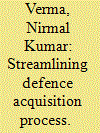

|
|
|
|
|
| Publication |
2010.
|
| Summary/Abstract |
The process for Defence Acquisitions in India has evolved considerably in the last
decade or so, and is being refined further. The Ministry of Defence recognizes
the importance of timely modernization, and of balancing the operational needs
with the requirements of transparency and probity. There are a number of areas
where further initiatives are being considered and the Ministry of Defence, in
consultation with all stake holders, would be moving forward in this regard.
Our combined aim should be to finally give the soldiers, sailors, and airmen in
the frontline, the right capability at the right time.
|
|
|
|
|
|
|
|
|
|
|
|
|
|
|
|
| 13 |
ID:
098322


|
|
|
|
|
| Publication |
2010.
|
| Summary/Abstract |
Transparency in public procurement bears an immediate cost both for
government and bidders. However, it is a key element to support fundamental
principles of the public procurement system, especially competition and
integrity. The drive for transparency must therefore be tempered by making
transparent what sufficiently enables corruption control. If the level of
transparency is adequately defined, the benefits will outweigh the cost,
especially when comparing the initial cost of transparency with the potential
negative consequences of corruption.
|
|
|
|
|
|
|
|
|
|
|
|
|
|
|
|
| 14 |
ID:
098320
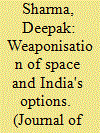

|
|
|
|
|
| Publication |
2010.
|
| Summary/Abstract |
During Cold War era, space became an essential adjunct for war-fighting on
the ground, without becoming another theatre of combat. While militarization
of space proceeded rapidly, the weaponisation of space was avoided. Because
the weaponisation of space was avoided during the Cold War, it does not
necessarily follow that weaponisation will continue to be avoided in a new era
of asymmetric warfare. We can improve protection of satellites against some
threats, but satellites will remain easy targets for space weapons designed to
kill on impact. Space has been free from warfare. No weapons have ever been
used in or from space, and no satellites have been destroyed in combat. A
glance at the global strategic situation reveals that many nations are rushing
to develop space capability. The capabilities in development around the world
are largely dual use and will have profound effects on the balance of power.
The issue at hand is how to effectively manage the security dilemmas that
will inevitably arise due to weaponisation of space. Many space faring nations
think that future wars will/may be fought in all medium including space. The
laws of aerodynamics cease to apply in space and one is therefore obliged to
consider it as a medium different from air. It is still far easier and more likely
for surprise attacks to be carried out on the ground than in space. During the
Cold War, nuclear-tipped missiles were always ready to fire. We will be safer if
we can prevent elevating this hair-trigger situation into space. If India has to
look at the threat to its space assets, it can be concluded that though there is
a threat to space assets from our perceived adversary, it is neither critical nor
alarming. Indian defence forces primary dependence on space based systems
if any, can easily be transformed to secondly by developing alternates for both
ground and aerial platforms. In future the dependence on space based systems
can be further reduced by India by inducting state-of-the-art alternate systems
to supplement the space system as alternates.
|
|
|
|
|
|
|
|
|
|
|
|
|
|
|
|
|
|
|
|
|